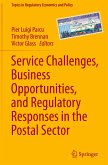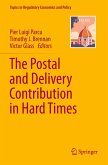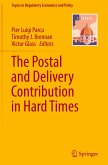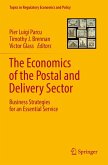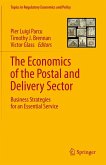Postal Strategies
Logistics, Access, and the Environment
Herausgegeben:Parcu, Pier Luigi; Brennan, Timothy J.; Glass, Victor
Postal Strategies
Logistics, Access, and the Environment
Herausgegeben:Parcu, Pier Luigi; Brennan, Timothy J.; Glass, Victor
- Gebundenes Buch
- Merkliste
- Auf die Merkliste
- Bewerten Bewerten
- Teilen
- Produkt teilen
- Produkterinnerung
- Produkterinnerung
This edited book includes original essays by prominent researchers and practitioners in the field of postal and delivery economics, originally presented at the 30th Conference on Postal and Delivery Economics held in Rimini, Italy, May 25-27, 2022. The central foci of the book are the role of digital platforms in the postal sector and the impact of vertically integrated firms in delivery markets. Other important topics include the regulation of parcels and their environmental footprint, in light of the innovations affecting the so-called last mile, and the effects of the COVID-19 pandemic on…mehr
Andere Kunden interessierten sich auch für
![Postal Strategies Postal Strategies]() Postal Strategies127,99 €
Postal Strategies127,99 €![Service Challenges, Business Opportunities, and Regulatory Responses in the Postal Sector Service Challenges, Business Opportunities, and Regulatory Responses in the Postal Sector]() Service Challenges, Business Opportunities, and Regulatory Responses in the Postal Sector134,99 €
Service Challenges, Business Opportunities, and Regulatory Responses in the Postal Sector134,99 €![The Postal and Delivery Contribution in Hard Times The Postal and Delivery Contribution in Hard Times]() The Postal and Delivery Contribution in Hard Times127,99 €
The Postal and Delivery Contribution in Hard Times127,99 €![The Postal and Delivery Contribution in Hard Times The Postal and Delivery Contribution in Hard Times]() The Postal and Delivery Contribution in Hard Times127,99 €
The Postal and Delivery Contribution in Hard Times127,99 €![The Economics of the Postal and Delivery Sector The Economics of the Postal and Delivery Sector]() The Economics of the Postal and Delivery Sector127,99 €
The Economics of the Postal and Delivery Sector127,99 €![The Economics of the Postal and Delivery Sector The Economics of the Postal and Delivery Sector]() The Economics of the Postal and Delivery Sector127,99 €
The Economics of the Postal and Delivery Sector127,99 €![The Contribution of the Postal and Delivery Sector The Contribution of the Postal and Delivery Sector]() The Contribution of the Postal and Delivery Sector104,99 €
The Contribution of the Postal and Delivery Sector104,99 €-
-
-
This edited book includes original essays by prominent researchers and practitioners in the field of postal and delivery economics, originally presented at the 30th Conference on Postal and Delivery Economics held in Rimini, Italy, May 25-27, 2022. The central foci of the book are the role of digital platforms in the postal sector and the impact of vertically integrated firms in delivery markets. Other important topics include the regulation of parcels and their environmental footprint, in light of the innovations affecting the so-called last mile, and the effects of the COVID-19 pandemic on the postal sector, on both the global and local levels. Chapters also discuss traditional topics for postal and delivery sectors, including postal costs, the funding of Universal Service Obligation (USO) and the related role of Universal Service Providers. This book is a useful tool not only for graduate students and professors interested in postal and regulatory economics but also for postaladministrations, consulting firms, and federal government departments.
Produktdetails
- Produktdetails
- Topics in Regulatory Economics and Policy
- Verlag: Springer / Springer Nature Switzerland / Springer, Berlin
- Artikelnr. des Verlages: 978-3-031-25361-4
- 2023
- Seitenzahl: 396
- Erscheinungstermin: 26. April 2023
- Englisch
- Abmessung: 241mm x 160mm x 27mm
- Gewicht: 758g
- ISBN-13: 9783031253614
- ISBN-10: 3031253612
- Artikelnr.: 66917534
- Herstellerkennzeichnung
- Springer-Verlag KG
- Sachsenplatz 4-6
- 1201 Wien, AT
- ProductSafety@springernature.com
- Topics in Regulatory Economics and Policy
- Verlag: Springer / Springer Nature Switzerland / Springer, Berlin
- Artikelnr. des Verlages: 978-3-031-25361-4
- 2023
- Seitenzahl: 396
- Erscheinungstermin: 26. April 2023
- Englisch
- Abmessung: 241mm x 160mm x 27mm
- Gewicht: 758g
- ISBN-13: 9783031253614
- ISBN-10: 3031253612
- Artikelnr.: 66917534
- Herstellerkennzeichnung
- Springer-Verlag KG
- Sachsenplatz 4-6
- 1201 Wien, AT
- ProductSafety@springernature.com
Pier Luigi Parcu is part-time Professor at the European University Institute (Italy) and Director of the Centre for a Digital Society and of the Centre for Media Pluralism and Media Freedom. Previously he worked as Director of Investigation at the Italian Competition Authority (AGCM), Chief Economist at the Italian Security and Exchange Commission (CONSOB), Economist at the International Monetary Fund (IMF) and CEO of the Italian System Operator. His research addresses the democratic and economic challenges associated with digital platforms, as part of his broader interest in innovation dynamics in the digital economy and in emerging technologies. He is frequently invited as expert by European and international institutions and has extensively published books and articles in the fields of telecommunications, postal & delivery sectors, antitrust, media. Victor Glass is Professor of professional practice in the finance and economics department at Rutgers Business School (US). He is Director of the Center for Research in Regulated Industries. For almost thirty years, he was responsible for forecasting demand and setting access rates for more than 1,100 telephone companies and was heavily involved in regulatory reform. He has published studies of market and regulatory issues that have appeared in academic journals and trade magazines. Timothy J. Brennan is Professor Emeritus in the School of Public Policy at the University of Maryland, Baltimore County (US). He has published over 135 articles and book chapters, principally on antitrust and regulatory economics, including the electricity, telecommunications, postal, oil pipeline, and other infrastructure sectors. His current research is on competition policy, particularly vertical integration and structuring abuse of dominance cases, and on regulatory pricing and methods. He also has a strong interest in the nexus between economics and philosophy, which he has applied to questions such as the ethical underpinnings of climate policy.
Chapter 1 - Competitive strategies of marketplaces vis-à-vis logistic choices: issues for competition policy (Pier Luigi Parcu).- Chapter 2 - Lessons from the Experience of Telecommunications Regulation for Regulation in the EU Package Delivery Industry, with Focus on Access Regulation (Debra Aron).- Chapter 3 - Self-provision by online platforms vertically integrated into delivery activities (Alberta Corona).- Chapter 4 - The confluence of Competition Law, Consumer Protection and Sector-specific Regulation in the postal, delivery and related sectors (John Hearn).- Chapter 5 - Double jeopardy between regulatory and competition proceedings: the bpost judgment and the Digital Markets Act (Alessandra Fratini).- Chapter 6 - Twenty-five years of the National Postal Regulators in the EU. A critical review (Mateusz Cholodecki).- Chapter 7 - Locked into an access mindframe? Reflections on Access regulation in postal & delivery based on the case of parcel lockers (Bruno Basalisco).- Chapter 8 - Do we need regulation for parcel lockers? (Marine Lefort).- Chapter 9 - A Universal Support Fund for Postal Services in the United States (Victor Glass).- Chapter 10 - Incentives of Compensating USO net costs (Felix Gottschalk).- Chapter 11 - Public Funding and Industrial Synergies: How They Impact on the Calculation of the Net Cost of the USO? (Emanuele Frezza).- Chapter 12 - Can parcel growth support the sustainability of the USO? (Christian Strobel).- Chapter 13 - E-commerce's Effects on the Turkish Postal Market: from Classical to New Business Models (Ozhan Zurel).- Chapter 14 - Compensation of net costs generated by SGEIs. Examples from different European network industries (Stefano Gori).- Chapter 15 - E-commerce and parcel delivery: environmental policy with green consumers (Helmut Cremer).- Chapter 16 - Using pricing as a tool to achieve carbon neutrality: Implications for the United States Postal Service (Ian Stanford).- Chapter 17 - The environmental footprint of home and out-of-home parcels delivery (Claire Borsenberger).- Chapter 18 - Supporting Postal Services through Location-Based Fees (Tim Brennan).- Chapter 19 - Allocating fixed costs of the outdoor delivery: A cooperative game approach (Lea Munich).- Chapter 20 - On Efficient Rate Design (Ted Pearsall).- Chapter 21 - Measuring and Communicating a Universal Service Provider's wider Economic Value: Swiss Post's example (Felix Gottschalk).- Chapter 22 - How the Covid-19 crisis is impacting postal markets? A new assessment one year later (Antonin Arlandis).-Chapter 23 - UK Parcel Market Trends in the Pre- and Post-Covid Environment: An Initial Assessment (Catherine Cazals).- Chapter 24 - Exploring the use of control theory to describe and assess the UK's postal regulatory framework, including lessons that can be learnt and applied from this tool for regulation (Matthew Thomas).- Chapter 25 - On the Prediction of the Postal Service's Marginal and Total Operating Costs (Soiliou Namoro).- Chapter 26 - Logistics constraints for international e-commerce (Mauro Boffa).- Chapter 27 - Transparency Initiatives in the Belgian Postal Sector (Ozhan Zurel).
Chapter 1 - Competitive strategies of marketplaces vis-à-vis logistic choices: issues for competition policy (Pier Luigi Parcu).- Chapter 2 - Lessons from the Experience of Telecommunications Regulation for Regulation in the EU Package Delivery Industry, with Focus on Access Regulation (Debra Aron).- Chapter 3 - Self-provision by online platforms vertically integrated into delivery activities (Alberta Corona).- Chapter 4 - The confluence of Competition Law, Consumer Protection and Sector-specific Regulation in the postal, delivery and related sectors (John Hearn).- Chapter 5 - Double jeopardy between regulatory and competition proceedings: the bpost judgment and the Digital Markets Act (Alessandra Fratini).- Chapter 6 - Twenty-five years of the National Postal Regulators in the EU. A critical review (Mateusz Cholodecki).- Chapter 7 - Locked into an access mindframe? Reflections on Access regulation in postal & delivery based on the case of parcel lockers (Bruno Basalisco).- Chapter 8 - Do we need regulation for parcel lockers? (Marine Lefort).- Chapter 9 - A Universal Support Fund for Postal Services in the United States (Victor Glass).- Chapter 10 - Incentives of Compensating USO net costs (Felix Gottschalk).- Chapter 11 - Public Funding and Industrial Synergies: How They Impact on the Calculation of the Net Cost of the USO? (Emanuele Frezza).- Chapter 12 - Can parcel growth support the sustainability of the USO? (Christian Strobel).- Chapter 13 - E-commerce's Effects on the Turkish Postal Market: from Classical to New Business Models (Ozhan Zurel).- Chapter 14 - Compensation of net costs generated by SGEIs. Examples from different European network industries (Stefano Gori).- Chapter 15 - E-commerce and parcel delivery: environmental policy with green consumers (Helmut Cremer).- Chapter 16 - Using pricing as a tool to achieve carbon neutrality: Implications for the United States Postal Service (Ian Stanford).- Chapter 17 - The environmental footprint of home and out-of-home parcels delivery (Claire Borsenberger).- Chapter 18 - Supporting Postal Services through Location-Based Fees (Tim Brennan).- Chapter 19 - Allocating fixed costs of the outdoor delivery: A cooperative game approach (Lea Munich).- Chapter 20 - On Efficient Rate Design (Ted Pearsall).- Chapter 21 - Measuring and Communicating a Universal Service Provider's wider Economic Value: Swiss Post's example (Felix Gottschalk).- Chapter 22 - How the Covid-19 crisis is impacting postal markets? A new assessment one year later (Antonin Arlandis).-Chapter 23 - UK Parcel Market Trends in the Pre- and Post-Covid Environment: An Initial Assessment (Catherine Cazals).- Chapter 24 - Exploring the use of control theory to describe and assess the UK's postal regulatory framework, including lessons that can be learnt and applied from this tool for regulation (Matthew Thomas).- Chapter 25 - On the Prediction of the Postal Service's Marginal and Total Operating Costs (Soiliou Namoro).- Chapter 26 - Logistics constraints for international e-commerce (Mauro Boffa).- Chapter 27 - Transparency Initiatives in the Belgian Postal Sector (Ozhan Zurel).



